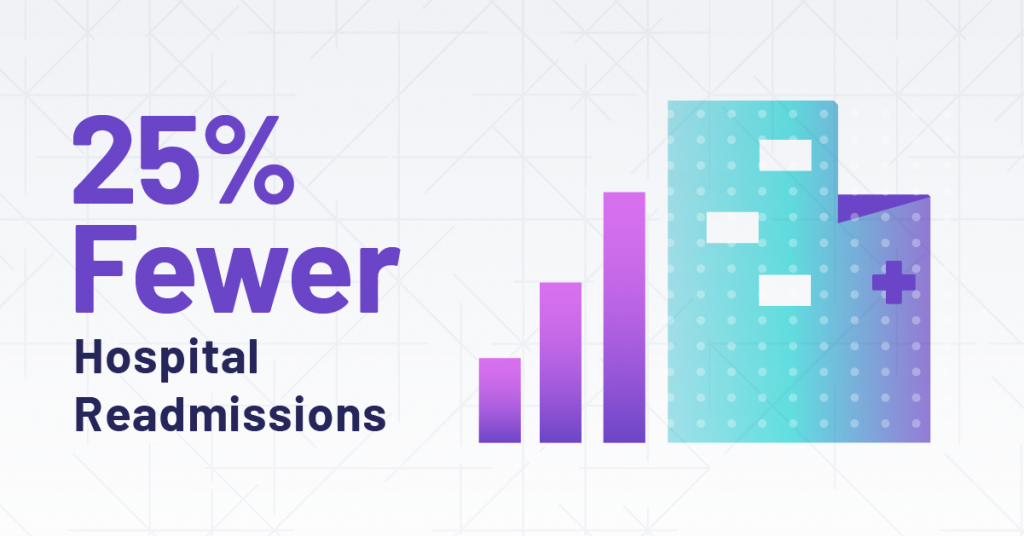Study: Clinical AI Reduces All-Cause Hospital Readmissions by 25% in 6 Months
By Dr. John Showalter, MD, MSIS, Chief Product Officer at Jvion

A recent study published in the Applied Clinical Informatics journal found that our prescriptive clinical AI solution, the Jvion CORE™, reduced all-cause readmissions by 25% at a regional hospital in LaCrosse, Wisconsin. While we’re no strangers to the impact we have on patient lives every day, we’re proud to see that impact validated by peer-reviewed research done by one of the world’s most renowned medical research institutions.
Read on to learn more about the study in question — and why it matters.
Readmissions: A Bellwether for Care Quality
When a patient is readmitted to the hospital within weeks of their discharge, it’s usually a sign of a gap in their care. It may be the result of a medical oversight, for instance an overlooked drug interaction. Or, readmissions could be the result of a failure to consider the patient’s lifestyle or socioeconomic circumstances in post-discharge care planning. For example, does the patient have a strong social support network? Do they have transportation to the pharmacy? Can they afford their medications? All these non-medical factors can put patients at risk for readmissions.
Of course, not all readmissions are avoidable. But research suggests as many as 75% of them could be avoided or reduced in severity with the right patient-centric interventions, communication, and care coordination. This is why readmissions are a key indicator of a hospital’s quality of care, and why readmission rates are directly tied to reimbursement in value-based care models.
Yet more than a decade after the shift to value-based care began, hospitals are still struggling to curb readmissions. In 2020, nearly half of America’s hospitals were penalized by the Centers of Medicaid and Medicare Services (CMS) for high 30-day readmission rates. Excluding the hundreds of critical access hospitals that were exempt from penalties due to their essential role in the health of their communities, 83% of evaluated hospitals were penalized.
When it comes to reducing readmissions, the challenge for the industry is twofold. The first challenge is identifying the patients at risk. The second challenge is identifying the interventions that will address their risk drivers and prevent readmission. While traditional predictive analytics solutions only address the first challenge, prescriptive AI solutions like the CORE address both challenges. By pulling insights from data, they help providers know which patients are at risk and, more importantly, what they can do about it to change their risk trajectory.
How a Wisconsin Hospital Reduced Readmissions by 25% in 6 Months
With the goal of reducing readmissions, a regional hospital in La Crosse, Wisconsin implemented the Jvion CORE clinical AI between November 2018 and April 2019. After the implementation, the CORE assessed every admitted patient for their risk of readmission. Care teams could see which patients were at highest risk via a web portal. For each patient at risk, the CORE also generated recommendations for patient-centric interventions that were likely to reduce their risk.
What sets the CORE apart from other clinical decision support tools is that in addition to considering clinical risk factors in the patient record, it also looks at external data on social, economic, behavioral, and environmental risk factors relevant to the patient. All told, over 4,000 risk factors for readmission are considered per patient. This not only enables a more precise view of the patients whose risk could be reduced, it ensures the intervention recommendations were more specific to the patients’ unique needs.
Six months after the CORE was implemented and care teams started actioning the recommendations, the hospital’s readmission rate dropped from 11.4% to 8.1%. That’s a 25% decrease in half a year, after accounting for the .5% drop in readmission rates seen at similar hospitals used as controls in the study.
You can read the full peer-reviewed study here. However, the success seen by this Wisconsin hospital is far from the first time the CORE has demonstrated success in reducing readmissions. Check out our case study on how one of New York’s largest health systems reduced readmissions by 23.6% by implementing the CORE into their transitions of care management program. Or, visit our Insights and Resources page for more Jvion success stories.

